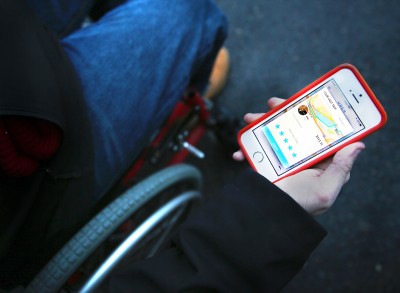
Massachusetts Gov. Charlie Baker announced the launch of a pilot paratransit program that will be a coalition between Massachusetts Department of Transportation Secretary and CEO Stephanie Pollack, disability advocates, the Massachusetts Bay Transportation Authority, Uber and Lyft to assist paratransit customers, according to a Friday press release.
The On-Demand Paratransit Pilot Program follows an initiative launched in January that subsidizes taxicab trips for people who use THE RIDE, the MBTA’s door-to-door transportation service for those who are unable to use fixed-route transit, the press release stated. The pilot program is a part of THE RIDE, and will offer on-demand services as well as lower costs for the MBTA.
“This pilot takes a major step toward providing the kind of flexibility, responsiveness and on-demand customer service that has been the focus of our reforms, and that our paratransit riders deserve,” Pollack said in the release.
Up to this point, THE RIDE service costs the MBTA $31, with customers giving one-day advance notice, with a $3.15 set fare. Now, THE RIDE program will have on-demand service for the Uber or Lyft app or phoning in using Lyft. Customers will pay the first $2 of the trip, the MBTA will cover the next $13, and if the ride exceeds $15, the customer will pay the difference, according to the release.
Adrian Durbin, a spokesperson for Lyft, said the RIDE program is a “win-win” situation for both customers and the MBTA.
“The T is going to save a lot of money versus what they spend on many current rides taken through THE RIDE,” Durbin said. “For passengers not having to book 24 hours in advance and having the ability to get a car on demand is a significant service improvement.”
The release stated that Lyft would work with a local Americans with Disabilities Act/nonemergency medical transportation firm to provide Lyft drivers with wheelchair-accessible vehicles.
“To incentivize the supply of wheelchair accessible vehicles on the road, the MBTA will offer an additional $12 per completed trip to those Lyft drivers using an accessible rental,” according to the release. “Uber currently has wheelchair accessible vehicles through its UberACCESS program that will be available for the MBTA pilot.”
Both Uber and Lyft said they are proud to partner with MBTA’s pilot program because it is expanding the companies to include more Massachusetts residents.
“We are honored to be working with the MBTA to improve convenient and reliable transportation options for their customers, our riders,” Chris Taylor, Uber’s Boston General Manager, said in the release. “Uber’s technology has helped expand access to convenient transportation options, while improving mobility and independence for thousands of people across the Commonwealth.”
Several Boston residents said that they see the merits of the program.
Peg LeGendre, 66, of East Boston, said she thinks the program has potential.
“This program can do a lot of good for a lot of people by helping the elders travel easier,” LeGendre, said.
Ernesto Soto, 29, of Fenway, also said he sees the possible benefits of the program.
“If it’s well-managed it can be very useful, and it shows how modern technology can be used by the government,” Soto said.
Russell Lopez, 57, of downtown Boston, mentioned that the program will need to minimize corruption.
“The subsidy by the government means that there can be no corruption, otherwise it can open up a new hole for taxpayer money,” Lopez said.

















































































































